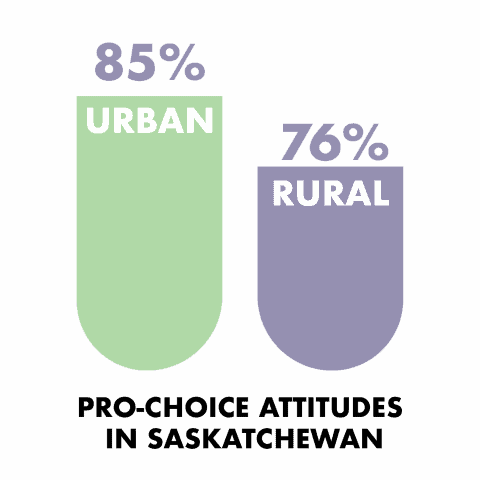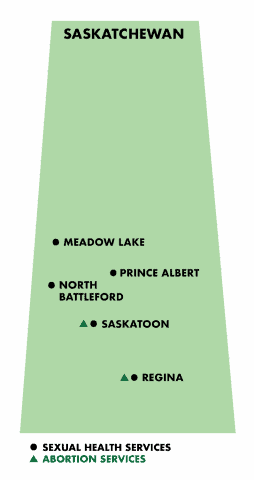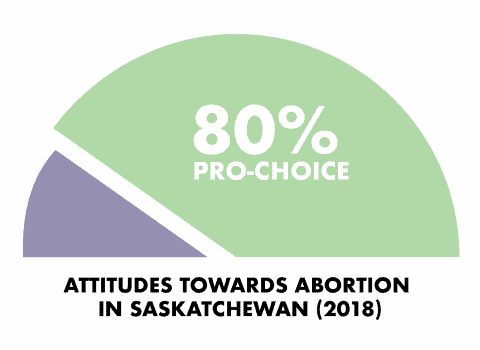 In the province of Saskatchewan, the need to recognize the barriers to accessing abortion and support services for women is paramount. As community initiatives emerge to bolster the options available for women, the need for increased awareness is obvious.
In the province of Saskatchewan, the need to recognize the barriers to accessing abortion and support services for women is paramount. As community initiatives emerge to bolster the options available for women, the need for increased awareness is obvious.
In Canada, it has been legal for a woman to obtain an abortion since 1988. The Canada Health Act defines abortion as a medically necessary procedure, meaning that it should be paid for by provincial health care, and ideally, should be accessible. In rural Saskatchewan, this is hardly the case.
There are only four medical centres able to provide abortion services in the province, and these are concentrated in the major cities — in Saskatoon, at Saskatoon City Hospital, College Park Medical Clinic and the Saskatoon Community Clinic, and in Regina, at the Women’s Health Centre in the Regina General Hospital. Of these clinics, only in Regina can a woman access an abortion from 12 to 16 weeks into pregnancy.
It can be especially difficult for women living where abortion services are not available to terminate a pregnancy because they must drive long distances to access the service in these centres — potentially incurring travel, accommodation or child-care costs along the way.
As well, in Saskatchewan, abortion procedures are typically accessed through a complex bureaucratic system that can include a doctor’s referral and several layers of appointments. To complicate this system further, there are large differences in policy between Regina and Saskatoon. This referral is an extra, time-consuming step that could mean more emotional stress for women, time away from work and greater travel costs incurred.

On Sept. 5, 2017, the Saskatchewan Drug Plan began covering Mifegymiso, an abortion pill approved for use by Health Canada in July 2015. Costs can vary on an individual basis — depending on factors such as income, enrollment in other benefit programs and private insurance coverage. This has increased access for many women, but abortions remain costly and difficult to obtain for others.
In addition to the barriers preventing women from actually obtaining an abortion, there are even fewer options for post-procedure support. Community initiatives and organizations like Saskatoon Sexual Health and Planned Parenthood Regina offer some supplemental supports, and recently, in Saskatoon, there have been opportunities for those interested in becoming support persons themselves.
One such opportunity is an upcoming training session being held in Saskatoon: Trauma Informed Abortion Doula Training. The session is intended for people looking to support those navigating the hurdles around abortion in Saskatchewan.
Alani Caruso-Fitterer, who has received training to become a postpartum doula and is helping to organize the Trauma Informed Abortion Doula Training event, explains that abortion doulas are needed in a system with few supports.
“All of these factors make for a complicated and potentially traumatic experience [so] the Trauma Informed Abortion Doula training is about helping those that are going through this system that has limited access,” Caruso-Fitterer said in an email to the Sheaf. “This is a very new role here, and I believe that there is a need for it.”
Caruso-Fitterer also gave a description of the traditional role of a doula.
“Doulas help … new mothers and families navigate the time from pregnancy to birth and from birth to the early days and weeks. Doulas provide a spectrum of support, hands-on practical skills, compassionate presence and education,” Caruso-Fitterer said.
There are a multitude of roles for a doula to fill in the world of dealing with birth — including assisting with the emotional, physical and mental tolls of abortion procedures.
“A full-spectrum doula may fit into multiple roles, including supporting someone that is going through an abortion,” Caruso-Fitterer said. “The idea behind the full-spectrum doula is that any person that is pregnant, regardless of the final outcome — be that becoming a parent, adoption, miscarriage, … stillborn, or abortion — that person deserves and has the right to unconditional, judgement-free support.”
The role of a doula is an interesting one. Due to the profession being entirely outside of the realm of medical professionals, it’s easy to get confused about what a doula does, outside of the easily-conjurable image of being there to hold the hand of a labouring pregnant person. Caruso-Fitterer explains some of the duties that a doula can perform.
“The scope of a doula is broad, but one of the main things a doula does is help the mother — or person in care — advocate for themself. The doula is not a saviour — a doula might give breastfeeding support, or refer local resources, or assist with the family and home preparation,” Caruso-Fitterer said.
Caruso-Fitterer explains some of the ways in which a doula can assist in an abortion situation.
“In the case of someone that is [getting] or has gotten an abortion, a doula might accompany them to an appointment and listen and offer emotional presence and support to the person about their abortion,” Caruso-Fitterer said.
On the topic of the upcoming Trauma Informed Abortion Doula Training session, Caruso-Fitterer explains that it is not limited to any particular type of individual.
“This training is for anyone interested in supporting people through a medical, surgical or spontaneous abortion,” Caruso-Fitterer said. “It was developed and will be facilitated by Shannon Hardy, a social worker, full-spectrum doula and sexual-health educator in Halifax, N.S., [and the] founder of Abortion Support Services Atlantic.”
Caruso-Fitterer has just finished her training to become a postpartum doula with Birth Ways International, and she shares about her experience receiving the training and doula work in general.
“I was humbled and inspired by everyone’s commitment to the work and tenderness of being a doula — it recognizes strength in vulnerability, strength in asking for help and in mothers advocating for themselves,” Caruso-Fitterer said. “This is the kind of work that builds community and resources to support mothers and their families while developing strong, collaborative, professional relationships among doulas, especially in here in Saskatoon.”
The topic of abortion is one mired in a variety of connotations and often surrounded by biases and judgements. Caruso-Fitterer speaks to the importance of a system of support in the climate surrounding abortion.
“Ultimately, it’s a choice that shouldn’t [have] to be made harder [or more] shameful by a system that has political and moral implications behind it,” Caruso-Fitterer said. “If there is recognized support in place that goes in hand with safe and accessible abortion services, then we can shift out-of-date perspectives that put shame and stigma on women’s bodies and autonomy.”
Trauma Informed Abortion Doula Training will be held on Oct. 6 and 7 and will take place at the Central Urban Métis Federation. Those looking to secure a spot in the training can inquire or reserve a spot by emailing doulatrainingyxe@gmail.com.
—
Emily Migchels / Editor-in-Chief, Jack Thompson / Sports & Health Editor
Infographics: Jaymie Stachyruk / Graphics Editor
Leave a Reply